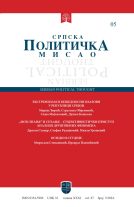- Home page
- Researchers
- Milan Jovanović
Milan Jovanović
Faculty of Political Science, University of Belgrade

DETERMINING CONTEXTUAL FACTORS OF THE 2022 SNAP ELECTIONS IN THE REPUBLIC OF SERBIA
The goal of this research is to determine four key contextual political factors in shaping the political framework for holding snap parliamentary elections in 2022. Some of them belong to long-term processes, such as the decline of democracy and opposition contestation of election conditions, while others are the products of current political events, such as environmental protests, opposition boycotts of elections, and the war in Ukraine. As a central factor, we single out the absence of inter-party dialogue and opposition participation in the 2020 elections, which produced an almost one-party representative body and a lack of parliamentary pluralism. Simultaneously we observe continuous democratic erosion of the Republic of Serbia, which prevents the long-term consolidation of democratic institutions. By the second cause, we imply the electoral calculation of the ruling party in unifying the Belgrade local elections with the presidential and parliamentary elections to ensure electoral victory. Environmental protests in 2021, initiated after the adoption of disputed normative acts without public deliberation, stand out as the third factor. The fourth reason for new elections included the positioning of Serbia within the conflict between Russia and Ukraine, requiring a review of the general will of the citizens and the consensus of the leading political actors on the issue of Kosovo and Metohia.

CHANGES TO THE LEGAL ELECTORAL THRESHOLD AND ITS EFFECTS ON REPRESENTATION OF NATIONAL MINORITY PARTIES - LOCAL ELECTIONS IN SERBIA IN 2020
The legal electoral threshold of 5% of valid votes has functioned in the Serbian electoral system for virtually two decades. Since 2004, it has not been applied to the electoral lists of national minority parties. In one cycle of local elections, in 2004, it was reduced to 3%. Ahead of the parliamentary, local and regional elections in 2020, negotiations between the government and the opposition on the conditions for free and fair elections resulted in a unilateral decision by the government to reduce the election threshold at all levels to 3%. In order to preserve the number of representatives of national minority parties, the law introduced a bonus—the quotients of national minority parties are increased by 35% when converting votes into seats using the highest quotient method. Greater representativeness is the basic argument that justifies this great electoral reform. However, the real motive behind this electoral engineering was to weaken the announced boycott of the elections by the opposition. This solution was criticized as contrary to the constitutional principles of equality of suffrage and non-discrimination. Additionally, there were worries that it could lead to fragmentation of the party system and situations where a party that has crossed the electoral threshold is left without a representative. The authentic interpretation of the law explains that the bonus will be applied only if the parties of national minorities do not cross the legal electoral threshold, and only for local elections. The paper analyzes the political consequences of lowering the electoral threshold in local elections in the context of proclaimed goals. The data shows that there was no increase in the number of national minority parties in the elections. As a rule, parties of national minorities won a larger number of seats in local assemblies. This is especially pronounced with the Alliance of Vojvodina Hungarians as the dominant party of this national minority. That growth is lower in the corps of Bosniaks and Albanians, where there is more pronounced party competition and growth is lower. Through this mechanism, the parties of smaller national minorities have become more visible in local assemblies through If the authentic interpretation had not been applied, the number of deputies of national minority parties would have increased further, and in some areas, the balance of power in forming the majority in local parliaments would have changed. Due to the boycott of the elections and the pandemic that caused lower turnout, the full effect of the new mechanism in the electoral system remained muted. The political consequences will be more visible and clearer after the next election cycle, when the actors will better analyze their potential.

The Designing of Serbia’s Electoral System
Electoral system reforms in Serbia followed the practice of post-socialist states - they were frequent and they became the “eternal” issue of institutional design. A century and a half of electoral experience of alternating between the majoritarian and proportional formulas and frequent interventions of governments into the electoral process could not serve as a model at the beginning of redemocratization. External factors initially acted as an inspiration to a small number of domestic experts. In the second phase, their influence increases. Contextual factors had the largest influence. Round table was used only in electoral system redesign and, even then, only when the government power was weakened. Head of state and Constitutional Court represent the most active institutions intervening into the electoral system, initiating reforms or revoking certain provisions of the electoral law. Perception of the stakeholders’ interests evolved along with the reforms. By positioning themselves in the parliament through the proportional electoral model with a closed list and with the right of the parties to allocate mandates as they wished regardless of the voting lists order, party elites have opposed all types of reforms that would emphasize personalization of elections. Election reforms in Serbia have been at a standstill for a decade. They are debated in professional and political circles. Negative effects of the current electoral system have been observed. Mechanisms available to designers, which serve to achieve goals and solve problems, are also known. The only thing missing is the power to transform them into electoral laws, as there is no political will to do so.
